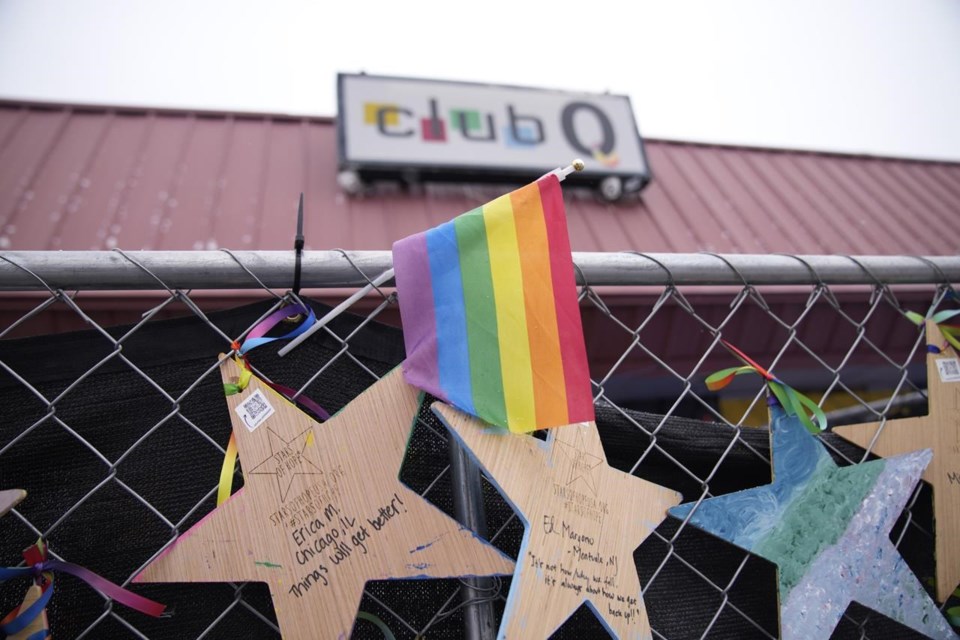WASHINGTON — The Human Rights Campaign declared a state of emergency for LGBTQ+ people in the U.S. on Tuesday and released a guidebook pointing to laws it deems discriminatory in each state, along with “know your rights” information and resources to help people relocate to states with stronger LGBTQ+ protections.
Sounding the alarm about the current political climate, the nation’s largest organization devoted to the rights of lesbian, gay, bisexual, transgender and queer Americans said travel advisories aren’t enough to help people already living in states where .
“We need champions right now," HRC President Kelley Robinson said in an interview with The Associated Press. President Joe Biden and other LGBTQ+ rights supporters with decision-making authorities, she said, need to be more than just allies.
The declaration is a call to action for “people in power at every level” of government and the business community, she said, urging them to fight for LGBTQ+ rights with the same fervor as they've fought for abortion rights since the U.S. Supreme Court last summer.
“When Dobbs fell, you saw a federal response to deal with the abortion crisis that we’re in," Robinson said. "We are in a crisis of even greater scale to the health and well-being of the LGBTQ+ community, and we need that same sort of response.”
Just a few days into Pride Month, the campaign said it’s taking action in response to an “unprecedented and dangerous” spike in discriminatory legislation sweeping state houses this year, with more than 525 anti-LGBTQ+ bills introduced and more than 70 signed into law so far in 2023 — more than double last year’s number.
A recent found that many bills seeking to ban or restrict gender-affirming health care for transgender youth, who have been the primary targets of state legislation this year, sprang not from grassroots or constituent demand, but from the pens of a few powerful conservative interest groups.
The HRC guidebook, meanwhile, provides information about filing complaints for civil rights violations and points to resources for financing moves and finding employment, particularly in the 17 states with a trifecta of Democratic leadership in both legislative chambers and the governor's office.
“The amount of calls I get every day from parents asking how they can move to another state because they’d rather mourn their home than their child is real," Robinson said. “This is a different level of urgency and demanded a different level of response.”
The emergency declaration is the first in the 43-year history of the HRC, which encompasses a foundation focusing on research, advocacy and education, national and state lobbying campaigns and a political action committee that supports and opposes candidates for office. It comes as Republican-dominated legislatures around the country have restricted , from pronoun usage and bathroom access to medical care and more.
is poised to become the latest state to enact new restrictions, after the veto-proof GOP-controlled Legislature on Tuesday sent a package to the governor that includes a ban on Lawmakers also overwhelming passed a bill outlining pronoun usage for students and another that would . The legislation is similar to the Florida law critics call “Don’t Say Gay.”
As many LGBTQ+ Americans are celebrating their identities this month against the backdrop of a dizzying array of new restrictions, some trans people and their families are scrambling to flee their home states.
For Debi Jackson, the mother of a trans child in Kansas City, Missouri, a from the Republican attorney general, which would have restricted gender-affirming care for minors and some adults, pushed the family to its breaking point.
“My kiddo has decided that they’ve had enough of having to think every single day about what the government is going to do to torment them next,” said Jackson, 49.
Her child, 16-year-old Avery, gained national notoriety in 2017 when they became the first trans person to grace the cover of National Geographic magazine at age 9. Jackson, who has since become an outspoken advocate for her child and others in the region, said her family had once pledged to stay in the state and keep fighting.
“Because we are so visible, we kind of worried, if we pack up and go, what message does that send other people, and would it seem like we were leaving them behind?” she said. “But moving doesn’t mean we’re giving up or throwing in the towel. If anything, it demonstrates just how dire this crisis has become.”
An increasing number of trans people this year have suddenly found themselves without access to the medical care many credit as life-saving. Some are turning to often-dangerous to avoid involuntarily reversing their physical transitions.
And as Pride Month festivities kick off this week, organizers are beefing up security amid threatened protests by some extremist groups. A mass shooting last fall inside a gay nightclub in Colorado Springs left many LGBTQ+ community members feeling especially vulnerable.
___
Hannah Schoenbaum is a corps member for the Associated Press/Report for America Statehouse ߣÄĚÉçÇř Initiative. Report for America is a nonprofit national service program that places journalists in local newsrooms to report on undercovered issues.
Hannah Schoenbaum, The Associated Press



